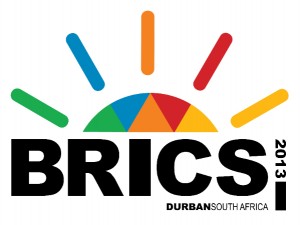

Follow us on:  
|

Latest

South Africa will host the 5th BRICS Summit in Durban on the 26-27 March, 2013
In a move that could significantly shift the global economic paradigm, the heads of the five BRICS countries meeting in Durban next week are expected to look at creating their own credit rating agency, a step towards a “more objective” assessment of the economic health of BRICS countries.
The formation of the much talked about BRICS Development Bank is also expected to be announced in Durban, although the final contours of the structure will be subsequently unveiled.
Earlier this week, Russian President Vladimir Putin ratified a report titled, Policy Concept on Russia’s Participation in BRICS, which is a major push to creation of independent rating agencies of BRICS states.
Russia will push for this new entity in the Durban Summit as “these agencies would contribute to a more objective assessment of the market position of national companies and banks in BRICS countries,” stated the report.
India has also been arguing for the urgent need to establish an international credit rating agency to “offset the biased agendas of some of the rating agencies.”
Former Indian union commerce and home secretary G K Pillai had said earlier in 2012, “the control of intelligence and information is so biased in many ways. We have international credit rating agencies like Moody’s and Standard and Poor so on that come out with reports that have immediate impact on countries”.
“I really don’t see why we do not get together to set up our own rating agencies which could independently assess, because the timing of the report itself lends suspicions that there is an agenda behind the report,” Pillai had asserted.
Besides the ratings agency, work on a BRICS Development Bank with a $50 billion seed capital has progressed sufficiently.
Fernando Pimentel, Brazil’s minister of development, industry and foreign trade said on Thursday, “I expect that the Brics leaders would approve the proposal for creation of the bank. But I am not sure if the proposal will go far enough to be presented at the Durban conference because some of the technical discussions are not yet over, and I can’t tell right now if the discussions will advance fast enough for us to have a proposal for the bank ready to be voted in Durban.”
He said regarding the expected capital participation structure, there is a consensus between the member countries that the proposed initial capital of the development bank would be $50 billion.
“But the participation of each of the Brics countries in that amount is not yet defined, nor has the voting structure of the bank’s board been defined. Since these are basically technical issues, we have consensus on some of them and not on others, but if we move with adequate speed may be Durban will see the creation of the new Brics development bank,” he added.
Russian deputy foreign minister Sergey Ryabkov had said the member countries are still looking at what niche space the Bank would occupy.
“We need to see how it will be introduced into the fabrics of international finance and what niche it will occupy. Several things are yet to be resolved in terms of headquarters, staffing, actual charter of the bank or terms of reference, whatever you call it, but those are secondary things,” Ryabkov said on Friday.
China’s assistant foreign minister Ma Zhaoxu, had also indicated that the structural details of the Bank are still under discussion.
“On the specifics of a development bank, including the size, functions, composition, and hosting city of such a development bank, all these details are still under discussion,” Mr Ma said on Wednesday.
In an exclusive interview with The BRICS Post, Georgy Toloraya, executive director, BRICS National Research Committee of Russia has confirmed the formation of the Bank, while ruling out stakes for the US or the EU in it.
The BRICS Post

© 2017 BRICS Media Limited. All rights reserved. Registered in England and Wales. No.8133697. Registered office: Devonshire House 60 Goswell Road London, EC1M 7AD
57 founding members, many of them prominent US allies, will sign into creation the China-led Asian Infrastructure Investment Bank on Monday, the first major global financial instrument independent from the Bretton Woods system.
Representatives of the countries will meet in Beijing on Monday to sign an agreement of the bank, the Chinese Foreign Ministry said on Thursday. All the five BRICS countries are also joining the new infrastructure investment bank.
The agreement on the $100 billion AIIB will then have to be ratified by the parliaments of the founding members, Chinese Foreign Ministry spokesman Lu Kang said at a daily press briefing in Beijing.
The AIIB is also the first major multilateral development bank in a generation that provides an avenue for China to strengthen its presence in the world’s fastest-growing region.
The US and Japan have not applied for the membership in the AIIB.
